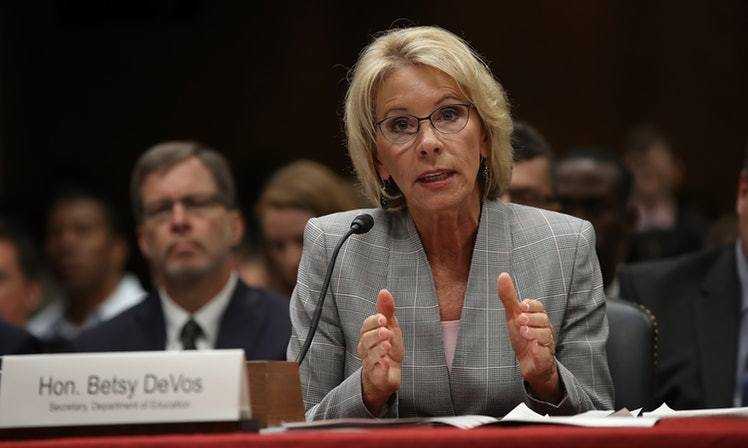Title IX was originally enacted as a part of the Education Amendments of 1972. The law prohibits federally funded institutions from discriminating against any student or employee on the basis of sex. Primarily, Title IX was utilized to create equal opportunities for women in high school and college sports. However, the use of Title IX and the subsequent connotation surrounding it transformed greatly beginning in the late 1980's. The Supreme Court ruled in 1986 that sexual harassment falls under the category of sex discrimination, as women are the overwhelming victims of such actions. Thus, sexual harassment and sexual assault could be tied into the regulations of Title IX. Since that ruling, a multitude of cases and policies have increased the liability of universities to investigate allegations of sexual assault under Title IX.
The liability of universities was especially increased with the 2011 “Dear Colleague” letter during the Obama Administration. Released on April 4th, 2011 by the Office for Civil Rights (OCR), the letter gave the federal government the power to outline the nuanced procedures universities must enforce when a student files a sexual assault claim. In defense of such power, the letter cites the famous “1 in 5” statistic, demonstrating that one in five women are the victims of attempted or completed sexual assault during their time in college. Additionally, the letter notes that all students, in order to fully benefit from the opportunities presented to them, must feel comfortable in their school environment. As such, it is the federal government’s responsibility to regulate how institutions handle claims of sexual assault. Some of the most important regulations in the “Dear Colleague” letter include:
· Colleges must use the preponderance of evidence standard when determining responsibility in a sexual assault case.
· Accusers must be allowed to appeal findings of non-responsibility.
· Universities should conduct and conclude these investigations within 60 days.
· Accusers should not be cross-examined during these investigations.The last regulation was created to avoid dissuading victims from coming forward out of fear of cross-examination and character defamation.
Perhaps the most controversial “Dear Colleague” letter policy is the preponderance of evidence standard in sexual assault investigations. The preponderance of evidence is the lowest standard of proof, requiring only 51% of evidence to assume guilt. This standard stands in sharp contrast to the “beyond a reasonable doubt” standard used in criminal court, which requires complete certainty to convict someone of an alleged offense.

Coupled with the lack of cross-examination in sexual assault investigations, critics of the “Dear Colleague” letter and its policies claim that the proceedings break down the American system of justice and create a climate in which sexual assault allegations are always to be believed, causing the accused to lose their right to “innocent until proven guilty.” On the contrary, supporters of the lower standard of proof and other procedures believe that the “Dear Colleague” letter demonstrates great progress in the fight for full gender equality and a system that works for victims of sexual violence. They argue that it reduces the overall presence of sexual violence on college campuses. The new Secretary of Education, Betsy DeVos, and other appointed officials under the Trump administration are among the critics of Obama-era sexual assault legislation and initiatives. DeVos announced in September of 2017 that her department would rescind the “Dear Colleague” letter. In concurrence with this announcement, the Department of Education released a Q&A on how colleges should now handle allegations and investigations of sexual assault. The new administration still maintains, parallel to the Obama-era policies, that universities should be responsible for these investigations rather than to leave it up to law enforcement. However, the mandates the Trump administration has put in place for how schools should do so varies greatly from the earlier procedures.
Specifically, the Trump-era policies leave almost all decisions on how to conduct sexual assault investigations up to individual schools, with methods subject to review by the OCR. The administration gives no guidelines for what qualifies as a “prompt” investigation, removing the 60-day time frame in the “Dear Colleague” letter.
The new policies allow the schools to decide which standard of evidence to use in the proceedings, given a choice of continuing to use the preponderance of evidence standard or adopting a clear and convincing evidence standard. Finally, the Q&A establishes that there must be complete equality in the treatment of accuser and accused. Namely, under this new standard, accusers may be cross-examined during the investigations.

These new guidelines should not come as a surprise, as DeVos frequently expressed her condemnation of the Obama “Dear Colleague” letter. In an August interview with The Associated Press, the Education Secretary stated that the procedures were just “not working right and well for anyone.” She also said that, in developing her department’s new policies, she and others were speaking with people from all sides of the issue, both survivors and accused individuals, as well as administrators of the institutions handling sexual assault claims and investigations.
These new guidelines have been met with heated debate. Supporters praise what they view as the reestablishment of a fair system of investigation for all parties, including the accused. Opponents believe this is a major step backward from the progress made under the Obama administration for sexual assault survivors. However, there may still be hope for those who oppose DeVos’s new guidelines, as they leave much of the choice up to individual colleges. Thus, institutions may choose to continue using the preponderance of evidence standard and other Obama-era procedures. At this point, it is difficult to discern how many universities will adopt stricter standards of proof for determining guilt. One thing is for certain: the road to truly mediating the issue of campus sexual assault is still long and winding.
